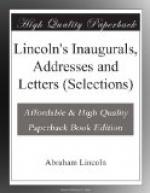It is surely safe to assume that the thirty-nine framers of the original Constitution, and the seventy-six members of the Congress which framed the amendments thereto, taken together, do certainly include those who may be fairly called “our fathers who framed the government under which we live.” And so assuming, I defy any man to show that any one of them ever, in his whole life, declared that, in his understanding, any proper division of local from Federal authority, or any part of the Constitution, forbade the Federal Government to control as to slavery in the Federal Territories. I go a step further. I defy any one to show that any living man, in the whole world ever did, prior to the beginning of the present century (and I might almost say prior to the beginning of the last half of the present century), declare that, in his understanding, any proper division of local from Federal authority, or any part of the Constitution, forbade the Federal Government to control as to slavery in the Federal Territories. To those who now so declare I give not only “our fathers who framed the Government under which we live,” but with them all other living men within the century in which it was framed, among whom to search, and they shall not be able to find the evidence of a single man agreeing with them.
Now, and here let me guard a little against being misunderstood. I do not mean to say we are bound to follow implicitly in whatever our fathers did. To do so would be to discard all the lights of current experience—to reject all progress, all improvement. What I do say is, that if we would supplant the opinions and policy of our fathers in any case, we should do so upon evidence so conclusive, and argument so clear, that even their great authority, fairly considered and weighed, cannot stand; and most surely not in a case whereof we ourselves declare they understood the question better than we.
If any man at this day sincerely believes that a proper division of local from Federal authority, or any part of the Constitution, forbids the Federal Government to control as to slavery in the Federal Territories, he is right to say so, and to enforce his position by all truthful evidence and fair argument which he can. But he has no right to mislead others, who have less access to history, and less leisure to study it, into the false belief that “our fathers who framed the Government under which we live” were of the same opinion—thus substituting falsehood and deception for truthful evidence and fair argument. If any man at this day sincerely believes “our fathers who framed the Government under which we live” used and applied principles, in other cases, which ought to have led them to understand that a proper division of local from Federal authority, or some part of the Constitution, forbids the Federal Government to control as to slavery in the Federal Territories, he is right to say so. But he should, at the same time, brave the responsibility of declaring that, in his opinion, he understands their principles better than they did themselves; and especially should he not shirk that responsibility by asserting that they “understood the question just as well, and even better, than we do now.”




